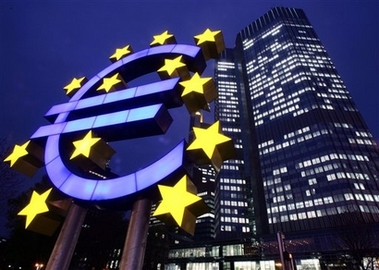FRANKFURT, Germany - The European Central Bank
raised its key interest rate by a quarter percentage point to 3 percent on
Thursday, the fourth such increase in eight months as it tries to curb
inflation.
The move had been expected as the bank tries to reign in price increases, and
follows a similar move earlier in the day by the Bank of England.
|

The Euro sculpture is
seen in front of the European Central Bank in Frankfurt, central Germany,
Nov. 30, 2005. The European Central Bank is expected to lift interest
rates to 3 percent Thursday, Aug. 3, 2006 when it meets this week _ its
fourth increase in eight months as it juggles fighting inflation with
maintaining economic growth in the 12-nation euro zone. [AP]
|
It also could lead to a sustained acceleration in the pace of rate
hikes - something markets will be looking for hints about from ECB
President Jean-Claude Trichet.
The rate hike came only minutes after the Bank of England boosted its key
interest rate a quarter percentage point to 4.75 percent in what it said was a
necessary move to curtail inflation. That was the first change to the rate since
August 2005, when the Bank of England cut the rate by a quarter of a percentage
point to 4.5 percent.
While higher interest rates increase the cost of mortgages and auto loans,
they also can benefit consumers by increasing yields on interest-bearing
investments.
Stubbornly high oil prices and fears that the threat of inflation is looming
larger have led many analysts to expect more rate hikes to follow.
Against this backdrop of above-target inflation as well as brighter economic
prospects, all 49 analysts and ECB watchers polled by Dow Jones Newswires had
said they expected an increase. All but one said it would be a quarter of a
percentage point, with the other predicting a half-point increase.
The increase marked a departure from a pattern started in December of raising
rates by a quarter-point in the last month of each quarter. In raising the key
refinancing rate, analysts said that the decision would likely lead to the
likely acceleration in the pace of rate hikes to every two months.
Twenty-nine of the economists polled by Dow Jones said they believed the
interest rate would be at 3.5 percent by the end of 2006, while 17 said it would
be at 3.25 percent, with the next increase likely in October, when the bank
meets in Paris.
Economic confidence in the 12 euro-zone countries reached its highest level
in more than five years in July, while unemployment fell to a record low of 7.8
percent in June. Moreover, figures from Germany - the euro-zone's biggest
economy - showed that unemployment fell in July, when it usually rises as
students look for work.
Other data said manufacturing in the euro zone expanded at close to its
fastest pace in six years in July.
Matthew Sharratt, an economist with Bank of America in London, said that this
week's "stronger-than-expected sentiment data, together with inflation still well above
target suggests that the ECB will likely be keen to continue
withdrawing monetary accommodation."
Meanwhile, the Bank of England has sprung a surprise quarter-point interest
rate increase to 4.75 percent, the first rate move for one year.
Most analysts had expected no change. In reaction to Thursday's shock
announcement, sterling jumped to 1.8844 dollars, compared with 1.8722 before the
news.
"Against the background of firm growth, limited spare capacity, rapid growth
of broad money and credit, and with inflation likely to remain above the target
for some while, the committee judged that an increase of 0.25 percentage points
in the official Bank rate to 4.75 percent was necessary," the BoE said in a
statement.
The last interest rate move was in August 2005 when policymakers trimmed
borrowing costs by a quarter-point to 4.50 percent.